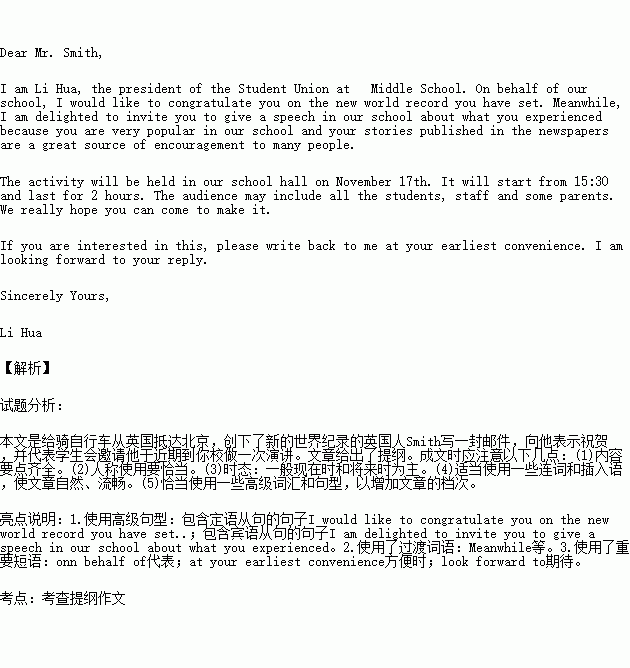ΧβΡΩΡΎ»ί
ΦΌ…ηΡψ «Ρ≥÷–―ß―ß…ζΜα÷ςœ·άνΜΣΘ§Ρψ¥”±®÷Ϋ…œΒΟ÷Σ”ΔΙζ»ΥSmith œ»…ζΤοΉ‘––≥Β¥””ΔΙζΒ÷¥ο±±Ψ©Θ§¥¥œ¬ΝΥ–¬ΒΡ άΫγΦΆ¬ΦΓΘ«κΡψ”Ο”ΔΈΡΗχΥϊ–¥“ΜΖβ” ΦΰΘ§œρΥϊ±μ ΨΉΘΚΊΘ§≤Δ¥ζ±μ―ß…ζΜα―ϊ«κΥϊ”ΎΫϋΤΎΒΫΡψ–ΘΉω“Μ¥Έ―ίΫ≤ΓΘΡΎ»ίΑϋά®ΘΚ
1. ΥΒΟς―ϊ«κΥϊΒΡ‘≠“ρ
2. Ηφ÷Σ―ίΫ≤ΒΡœύΙΊ–≈œΔΘ®άΐ»γΘΚ ±ΦδΓΔΒΊΒψΓΔΧΐ÷ΎΒ»Θ©
3. ―·Έ Ε‘ΖΫ «Ζώ«Αά¥
ΉΔ“βΘΚ1. ¥ ΐ100Ήσ”“ΘΜ
2. ΩΣΆΖΚΆΫαΈ≤“―Ψ≠Ηχ≥ωΘ§≤ΜΦΤ»κΉή¥ ΐΓΘ
Dear Mr. Smith,
_______________________________________________________________________________
_______________________________________________________________________________
_______________________________________________________________________________
_______________________________________________________________________________
_______________________________________________________________________________
_______________________________________________________________________________
_______________________________________________________________________________
_______________________________________________________________________________
Sincerely Yours
Li Hua

